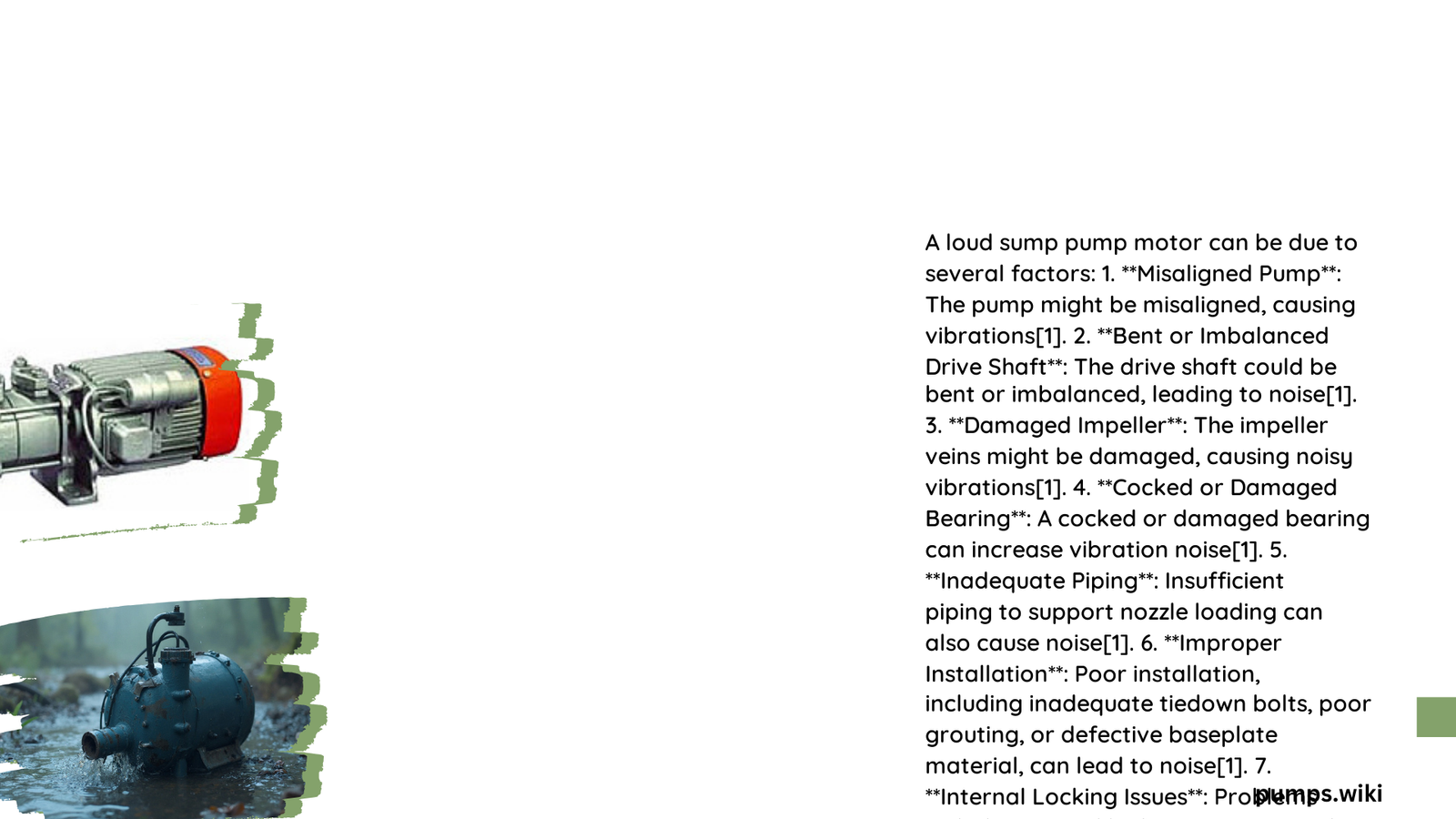Sump pump motors can be a significant source of noise in basements and crawl spaces. Typical noise levels range from 80-85 dB for electric pumps to over 100 dB for gas-powered models. Factors contributing to loud sump pump motors include vibration, improper installation, and mechanical wear. This article explores the causes of noisy sump pumps, industry standards for noise levels, and effective techniques to reduce pump noise, ensuring a quieter home environment.
Why Is My Sump Pump Motor So Loud?
Sump pump motors can become loud due to various reasons:
- Vibration from improper installation
- Worn-out bearings or other mechanical parts
- Cavitation (air bubbles in the pump)
- Loose components
- Inadequate soundproofing
Understanding these factors is crucial for addressing the issue of a noisy sump pump motor effectively.
What Are the Typical Noise Levels for Sump Pump Motors?

Sump pump motors produce different noise levels depending on their type and power source:
| Pump Type | Typical Noise Level |
|---|---|
| Electric | 80-85 dB |
| Battery | 80-85 dB |
| Gas | 100+ dB |
Electric and battery-powered pumps generally operate with a consistent hum, while gas-powered pumps can be significantly louder due to their internal combustion engines.
What Are the Industry Standards for Sump Pump Noise?
The industry standard for measuring pump noise is outlined in ISO 20361:2019. This standard specifies methods for determining:
- Sound power levels
- Sound pressure levels at the workstation
These measurements help manufacturers and purchasers understand and compare noise emissions from different pump models.
How Can I Reduce the Noise from My Sump Pump Motor?
Several effective techniques can help reduce sump pump motor noise:
-
Use soundproofing materials: Install acoustic panels or soundproofing foams around the pump area to absorb and reduce noise radiation.
-
Install a motor enclosure: A soundproof enclosure can significantly reduce noise by absorbing or dissipating sound energy.
- Use rubber or other vibration isolation mounts
-
Ensure proper securing of the pump to prevent rattling
-
Regular maintenance: Check for and address issues such as:
- Air leaks
- Contaminated grease or oil
-
Worn cam bearings
-
Use pulse hoses: These can help dissipate built-up pressure and energy, reducing pulsation noises.
Are There Silent Sump Pump Motor Options Available?
While completely silent sump pump motors are rare, some options produce less noise:
-
Centrifugal pumps: These typically operate below 80 dB due to their design without direction-changing parts. However, they may be less efficient and require more horsepower.
-
Diaphragm pumps with rubber valves: These can be quieter, especially when equipped with rubber valves instead of rigid materials like stainless steel.
When choosing a quieter sump pump, consider:
- Noise ratings provided by manufacturers
- Customer reviews mentioning noise levels
- Professional recommendations from plumbers or pump specialists
What Are Common Vibration Issues and Their Solutions?
Vibration is a significant contributor to sump pump noise. Common issues include:
- Improper outlet hose:
- Problem: Hoses that are too long, rigid, weak, or soft can cause pulsation and drumming sounds.
-
Solution: Use a properly sized pulse hose to mitigate this issue.
-
Contaminated lubricants:
- Problem: Dirty grease or oil can cause scratches and damage to the pump system.
-
Solution: Regular maintenance and cleaning of the pump environment.
-
Worn cam bearing:
- Problem: Wear on the plunger slot and cam bearing as the pump ages.
-
Solution: Proper maintenance and timely replacement of worn parts.
-
High flow at low pressure:
- Problem: This condition is more prone to noise.
- Solution: Ensure the pump is properly sized for your specific needs.
Addressing these vibration issues can significantly reduce the overall noise level of your sump pump motor.
How Does Proper Installation Affect Sump Pump Noise?
Proper installation plays a crucial role in minimizing sump pump noise:
-
Secure mounting: Ensure the pump is firmly attached to a solid surface to reduce vibrations.
-
Correct sizing: Choose a pump that’s appropriately sized for your home’s needs to prevent overworking and excessive noise.
-
Proper plumbing connections: Use flexible connectors and ensure pipes are the correct size to reduce noise from water flow.
-
Adequate ventilation: Proper airflow can help reduce motor heat and noise.
-
Correct pit design: A well-designed sump pit can help reduce turbulence and noise.
By following these installation best practices, you can significantly reduce the noise output of your sump pump motor.
What Are the Long-term Effects of a Loud Sump Pump Motor?
A consistently loud sump pump motor can have several long-term effects:
-
Increased stress and anxiety: Constant noise can lead to sleep disturbances and increased stress levels for household members.
-
Reduced property value: A noisy basement environment may be less appealing to potential buyers.
-
Potential hearing damage: Prolonged exposure to high noise levels (especially from gas-powered pumps) can lead to hearing issues.
-
Decreased pump lifespan: Excessive noise often indicates mechanical issues that, if left unaddressed, can shorten the pump’s operational life.
-
Higher energy costs: A noisy pump may be working inefficiently, leading to increased energy consumption.
Addressing sump pump noise promptly can help avoid these long-term consequences and ensure a more comfortable living environment.
